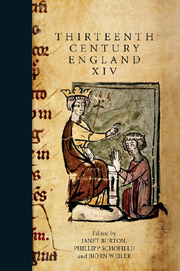Book contents
- Frontmatter
- Contents
- List of Figures and Tables
- Preface
- List of Contributors
- List of Abbreviations
- Politics and the People in Thirteenth-Century England
- Peasants, Litigation and Agency in Medieval England: the Development of Law in Manorial Courts in the late Thirteenth and Early Fourteenth Centuries
- Medieval Accounting Memoranda from Norwich Cathedral Priory
- The Seals of London's Governing Elite in the Thirteenth Century
- The Marriages of the English Earls in the Thirteenth Century: a Social Perspective
- Monks and Politics in Thirteenth-Century Wales and Catalonia
- Lope Fernández, Bishop of Morocco: His Diplomatic Role in the Planning of an Anglo-Castilian Crusade into Northern Africa
- On Kingship and Tyranny: Grosseteste's Memorandum and its Place in the Baronial Reform Movement
- St Edmund of Canterbury and Henry III in the Shadow of Thomas Becket
- Matthew Paris and the Royal Christmas: Ritualised Communication in Text and Practice
- Thomas of Lancaster in the Vita Edwardi Secundi: a Study in Disillusionment
- John and Henry III in the Anglo-Norman Prose Brut
- Genealogiae orbiculatae: Matthew Paris and the Invention of Visual Abstracts of English History
- The Genealogical Chronicles of Matthew Paris: Edition
John and Henry III in the Anglo-Norman Prose Brut
Published online by Cambridge University Press: 05 May 2013
- Frontmatter
- Contents
- List of Figures and Tables
- Preface
- List of Contributors
- List of Abbreviations
- Politics and the People in Thirteenth-Century England
- Peasants, Litigation and Agency in Medieval England: the Development of Law in Manorial Courts in the late Thirteenth and Early Fourteenth Centuries
- Medieval Accounting Memoranda from Norwich Cathedral Priory
- The Seals of London's Governing Elite in the Thirteenth Century
- The Marriages of the English Earls in the Thirteenth Century: a Social Perspective
- Monks and Politics in Thirteenth-Century Wales and Catalonia
- Lope Fernández, Bishop of Morocco: His Diplomatic Role in the Planning of an Anglo-Castilian Crusade into Northern Africa
- On Kingship and Tyranny: Grosseteste's Memorandum and its Place in the Baronial Reform Movement
- St Edmund of Canterbury and Henry III in the Shadow of Thomas Becket
- Matthew Paris and the Royal Christmas: Ritualised Communication in Text and Practice
- Thomas of Lancaster in the Vita Edwardi Secundi: a Study in Disillusionment
- John and Henry III in the Anglo-Norman Prose Brut
- Genealogiae orbiculatae: Matthew Paris and the Invention of Visual Abstracts of English History
- The Genealogical Chronicles of Matthew Paris: Edition
Summary
Probably composed during the reign of Edward I, with a concise narrative of British history running from the fall of Troy to the death of Henry III in 1272, the Oldest Version of the Anglo-Norman prose Brut was designed for an audience extending past the highest elites of Church and government. Markedly secular in perspective, baronial in its sympathies, and insular in focus, with some attention paid to Scotland, much less to Wales and Ireland, and almost none to the Continent beyond the English regnum, it offers both an account of some of the thirteenth century and a thirteenth-century perspective on the English past.
The earlier portions of the Oldest Version are based largely on the Historia regum Britannie of Geoffrey of Monmouth, Wace's Roman de Brut, and Gaimar's Estoire des Engleis, as well as hagiographic materials and romance matter such as that of Havelok. From the 1060s on, it is derived from something very close to, but not identical with, the extant version of the Latin chronicle of the Praemonstratensian house of Barlings in Lincolnshire, which in turn is closely related to the annals of Waverley and has passages analogous to Henry of Huntingdon, the Anglo-Saxon chronicle, John of Worcester, William of Malmesbury, Robert of Torigni, Ralph of Coggeshall, and Ralph Diceto. The writer is either using a fuller version of the Barlings chronicle than the one that survives, or he is occasionally consulting some of the same source texts, such as Henry of Huntingdon, John of Worcester, and William of Malmesbury, as well as Roger of Howden or an analogue to it (which is not used in Barlings).
- Type
- Chapter
- Information
- Thirteenth Century England XIVProceedings of the Aberystwyth and Lampeter Conference, 2011, pp. 169 - 182Publisher: Boydell & BrewerPrint publication year: 2013

